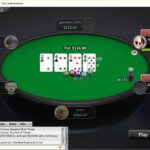Poker has almost as many constants as it does variables, and that is part of what makes it such an interesting game. You expect that if you play in a tight, solid fashion, the money will eventually flow to you. It may take awhile, and you may run very hot or very cold for a period of time, but realistically you will beat your game if you make enough correct decisions over a long enough sample of hands.
So far this blog has said nothing that you don’t (or shouldn’t) know, but I wanted us to consider together what will happen the next time that we are playing our normal, tight-solid game, and seemingly all the breaks are going our way. Some might call it a “rush”, a “hot streak”, “lucky”, or whatever, but the reality is that good results can and will clump together in some places, and when they do it seems like the deck is just blatantly hitting us in the face. We focus on what to do when the breaks are going against us – – avoiding tilt, switching games, stopping altogether for a break – – but when they are for us, the profit potential is so high that we’d be foolish NOT to have a plan.
My suggestion for you when everything is falling into place is to never be like your know-it-all Vegas buddy. He’s got a system for everything, it seems! He knows how to bet horses, roulette, blackjack, craps, he knows all the lingo, and he always comes home a loser. Why? It could be a lot of things, but one thing that I’ll guarantee you doesn’t help him is his “stop-win” limit. Basically, his stop-win limit tells him that if he shows up to the Blackjack table with $100, he will quit when either
A) He has lost all $100 (they never stop where they say they will), or
B) He has won $50, bringing his total stack to $150.
BUT, you and I both know that he won’t win more often than he loses, and even if he’s very skilled and it’s 50/50, he’ll win $50 for every time he loses $100. Mathematically, there’s no difference between that and walking up to the table, lighting $25 on fire, and walking away. That is why poker games and poker players are different, and why planning for your rushes matters. As a poker player, you are not playing the house, you are playing individual, unique, mistake-prone individuals, and many of them will make far too many errors by playing weak cards and chasing slim draws. You have the option to play them until they quit, you quit, or they are broke.
So this my recommendation for today: NEVER, EVER, EVER choose option #2! Never quit when your best customers are prepared to keep playing! If you are playing online, mark them, study them, exploit them, follow them – – poker is a ruthless meritocracy at its heart, and you are holding up your end of the bargain by playing well and taking money off of the less-informed or less-skilled masses. Rushes will come not at random, but when the fishiest fish in the tank are around, so the best way to plan for your rushes is to never plan on stopping at a certain win amount or a certain time! If you have other commitments to tend to (family, etc.) and time is limited, play a sit-and-go. Those at least have a pretty set time frame that everyone implicitly agrees to before cards are in the air. But if you’re a cash game or MTT player, always prepare for the rush by being ready and able to play for as long as is necessary. You owe it to your bankroll to pad it when able. Let us know if this has been true for you, and as always, Good Luck at the Tables!
I just thought this could illustrate what rushes can really do!!
Submit your review | |










